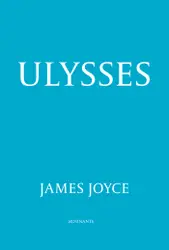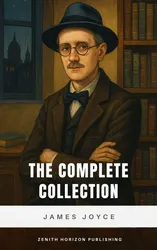Ulysses chronicles the peripatetic appointments and encounters of Leopold Bloom in Dublin in the course of an ordinary day, 16 June 1904. Ulysses is the Latinised name of Odysseus, the hero of Homer's epic poem Odyssey, and the novel establishes a series of parallels between the poem and the novel, with structural correspondences between the characters and experiences of Leopold Bloom and Odysseus, Molly Bloom and Penelope, and Stephen Dedalus and Telemachus, in addition to events and themes of the early twentieth century context of modernism, Dublin, and Ireland's relationship to Britain. The novel imitates registers of centuries of English literature and is highly allusive. Ulysses' stream-of-consciousness technique, careful structuring, and experimental prose — full of puns, parodies, and allusions — as well as its rich characterisation and broad humour, made the book a highly regarded novel in the modernist pantheon.

90 Masterpieces You Must Read (Vol.1) : Novels, Poetry, Plays, Short Stories, Essays, Psychology & Philosophy: The Madman, Moby-Dick, Siddhartha, Crime and Punishment, Hamlet, Great Expectations, Little Women, Meditations, The Einstein Theory, Heart of Darkness, The Red Badge of Courage
Walt Whitman, Herman Hesse, George Eliot, Kahlil Gibran, Anton Chekhov, Herman Melville, Oscar Wilde, Fyodor Dostoevsky, Nikolai Gogol, James Joyce, Henry David Thoreau, William Shakespeare, T. S. Eliot, John Keats, Charles Baudelaire, Walter Scott, Daniel Defoe, Louisa May Alcott, Jane Austen, Charlotte Brontë, Emily Brontë, Anne Brontë, Leo Tolstoy, Benito Pérez Galdós, William Makepeace Thackeray, Pierre Choderlos de Laclos, R.D. Blackmore, Alexandre Dumas, Marcel Proust, D. H. Lawrence, Charles Dickens, Thomas Hardy, Henry James, Guy de Maupassant, Princess Der Ling, Victor Hugo, Juan Valera, Anthony Trollope, Stephen Crane, E. M. Forster, Theodore Dreiser, Margaret Cavendish, Upton Sinclair, Plato, Apuleius, Marcus Aurelius, Sun Tzu, Voltaire, Miguel de Cervantes, Giovanni Boccaccio, Frederick Douglass, Sigmund Freud, H. A. Lorentz, Wallace D. Wattles, James Allen, Agatha Christie, Arthur Conan Doyle, Joseph Conrad, H. P. Lovecraft, Washington Irving, Mary Shelley, H. G. Wells, Edgar Allan Poe, Ernest Hemingway, L. Frank Baum, Robert Louis Stevenson, Mark Twain, Selma Lagerlöf, Jack London, Jules Verne, Lewis Carroll, Frances Hodgson Burnett, Rudyard Kipling, George Bernard Shaw, Soseki Natsume, Johann Wolfgang Goethe, Edgar Rice Burroughs, Brothers Grimm, Hans Christian Andersen
book
Ulysses
James Joyce
audiobookbook
50 Masterpieces you have to read before you die vol: 2
Louisa, Jane Austen, Joseph Conrad, D. H. Lawrence, George Eliot, Leo Tolstoy, James Joyce, Charles Dickens, Bram Stoker, Oscar Wilde, Honoré de Balzac, Edgar Rice Burroughs, Anne Brontë, Charlotte Brontë, Emily Brontë, Lewis Carroll, Willa Cather, Miguel de Cervantes, E. E. Cummings, Fyodor Dostoyevsky, Daniel Defoe, Arthur Conan Doyle, Alexandre Dumas, Gustave Flaubert, Henry James, Victor Hugo, Bookish
book
50 Timeless Masterpieces (Volume 1) : Essential Classics for a Rich Literary Journey
Homer, Sun Tzu, Plato, Dante, Shakespeare, Miguel de Cervantes, John Milton, Daniel Defoe, Johann Wolfgang von Goethe, Jane Austen, Nikolai Gogol, Emily Brontë, Mary Shelley, Alexandre Dumas, Fyodor Dostoevsky, Charles Dickens, Victor Hugo, Nathaniel Hawthorne, Gustave Flaubert, Leo Tolstoy, Henrik Ibsen, Herman Melville, Mark Twain, Robert Louis Stevenson, Arthur Conan Doyle, Raymond Chandler, H. G. Wells, Joseph Conrad, Rudyard Kipling, Louisa May Alcott, L. Frank Baum, L. M. Montgomery, T. S. Eliot, Franz Kafka, James Joyce, Virginia Woolf, C. S. Lewis, Ernest Hemingway, Walt Whitman, Jack Kerouac, John Steinbeck, William Faulkner, Kate Chopin, Zora Neale Hurston, Margaret Mitchell, Sylvia Plath, Thomas Mann, Albert Camus, George Orwell
book
The Bucket List Edition: The Greatest Classics in One Volume : Leaves of Grass, Siddhartha, Dubliners, Les Misérables, Don Quixote, Art of War, Middlemarch, Swann's Way…
Johann Wolfgang von Goethe, Stendhal, Jules Verne, Gustave Flaubert, Lewis Carroll, Theodor Storm, Henrik Ibsen, Charles Dickens, Plato, Honoré de Balzac, Mark Twain, Harriet Beecher Stowe, Rabindranath Tagore, Fyodor Dostoyevsky, Walt Whitman, Niccolò Machiavelli, Oscar Wilde, Robert Louis Stevenson, James Fenimore Cooper, Edgar Allan Poe, William Shakespeare, Giovanni Boccaccio, Confucius, George MacDonald, Bram Stoker, Charlotte Brontë, Anne Brontë, Emily Brontë, Henry David Thoreau, Jack London, Henry James, Louisa May Alcott, Victor Hugo, Arthur Conan Doyle, Frances Hodgson Burnett, Joseph Conrad, Jane Austen, Herman Melville, George Eliot, Laurence Sterne, Thomas Hardy, Jonathan Swift, Edith Wharton, Benito Pérez Galdós, Daniel Defoe, Henry Fielding, Alexandre Dumas, Rudyard Kipling, William Dean Howells, Kalidasa, Kenneth Grahame, Marcel Proust, Washington Irving, Juan Valera, Willa Cather, Nathaniel Hawthorne, Homer, Gaston Leroux, Charles Baudelaire, William Makepeace Thackeray, Voltaire, Kate Chopin, Apuleius, John Milton, Charlotte Perkins Gilman, Frederick Douglass, Laozi, John Keats, James Joyce, Ann Ward Radcliffe, Kahlil Gibran, Kakuzo Okakura, Soseki Natsume, Princess Der Ling, L. Frank Baum, H. G. Wells, W. B. Yeats, J. M. Barrie, G. K. Chesterton, T. S. Eliot, C. S. Lewis, D. H. Lawrence, E. M. Forster, H. P. Lovecraft, F. Scott Fitzgerald, Marcus Aurelius, Friedrich Nietzsche, Ivan Turgenev, Anton Chekhov, Leo Tolstoy, Nikolai Gogol, Sir, George Bernard Shaw, Miguel de Cervantes, Mary Shelley, Cao Xueqin, Emile Zola, Válmíki, Bankim Chandra Chatterjee, P. B. Shelley, Elizabeth von Arnim, Herman Hesse, Dante, Pedro Calderon de la Barca, Sun Tzu, Inazo Nitobé, George Weedon Grossmith, Willkie Collins, Lewis Wallace, M. Montgomery
book
50 Masterpieces you have to read before you die : The Secret Garden, The Odyssey, A Christmas Carol, Oliver Twist, The Wonderful Wizard of Oz, The Scarlet Letter, Treasure Island, Robinson Crusoe, Gulliver's Travels, The Picture of Dorian Gray, Dracula and others
Frances Hodgson Burnett, Homer, Charles Dickens, Lyman Frank Baum, Nathaniel Hawthorne, Thomas Hardy, Robert Louis Stevenson, Henry Haggard, Wilkie Collins, H. G. Wells, Sir Walter Scott, Lucy Maud Montgomery, Louisa May Alcott, Henry Fielding, Mary Shelley, Arthur Conan Doyle, Leo Tolstoy, Euripides, Fyodor Dostoevsky, Alexander Pushkin, James Fenimore Cooper, Daniel Defoe, Joseph Conrad, Jonathan Swift, William Shakespeare, Oscar Wilde, John Bunyan, Charles Darwin, Alfred Tennyson, Bram Stoker, James Joyce, Dante Alighieri, Howard Pyle, Jane Austen, Emily Bronte, Giovanni Boccaccio, Rudyard Kipling
book
The Ultimate Book Club: 180 Books You Should Read (Vol.1) : Leaves of Grass, Siddhartha, Middlemarch, The Jungle, Macbeth, Moby-Dick, A Study in Scarlet…
Walt Whitman, Herman Hesse, George Eliot, Kahlil Gibran, Anton Chekhov, Herman Melville, Oscar Wilde, Fyodor Dostoevsky, Gogol, James Joyce, Henry David Thoreau, William Shakespeare, T. S. Eliot, John Keats, Charles Baudelaire, Sir Walter Scott, Daniel Defoe, Louisa May Alcott, Jane Austen, Charlotte Brontë, Emily Brontë, Anne Brontë, Leo Tolstoy, Benito Pérez Galdós, William Makepeace Thackeray, Pierre Choderlos de Laclos, R.D. Blackmore, Alexandre Dumas, Marcel Proust, D. H. Lawrence, Charles Dickens, Thomas Hardy, Henry James, Guy de Maupassant, Princess Der Ling, Victor Hugo, Juan Valera, Anthony Trollope, Stephen Crane, E. M. Forster, Theodore Dreiser, Margaret Cavendish, Upton Sinclair, Plato, Apuleius, Marcus Aurelius, Sun Tzu, Voltaire, Miguel de Cervantes, Giovanni Boccaccio, Frederick Douglass, Sigmund Freud, H. A. Lorentz, Wallace D. Wattles, James Allen, Agatha Christie, Arthur Conan Doyle, Joseph Conrad, H. P. Lovecraft, Washington Irving, Mary Shelley, H. G. Wells, Edgar Allan Poe, Ernest Hemingway, L. Frank Baum, Robert Louis Stevenson, Mark Twain, Selma Lagerlöf, Jack London, Jules Verne, Lewis Carroll, Frances Hodgson Burnett, Rudyard Kipling, Edgar Rice Burroughs, Hans Christian Andersen, George Bernard Shaw, Soseki Natsume, Johann Wolfgang Goethe
book
Dubliners (Enriched Classics)
James Joyce
audiobookbook
The Complete Collection : Modernist Masterpieces Unabridged
James Joyce, Zenith Horizon Publishing
book
50 Masterpieces You Have to Read Before You Die – Volume 2
Jerome K Jerome, Charles Kingsley, James Joyce, Rudyard Kipling, D. H. Lawrence, Sheridan Le Fanu, Oscar Wilde, H.G. Wells, Lewis Carroll, Zenith Horizon Publishing
book
Ulysses : James Joyce's Groundbreaking Modernist Epic
James Joyce, Zenith Horizon Publishing
book
Dubliners : James Joyce's Masterpiece of Irish Life and Identity
James Joyce, Zenith Horizon Publishing
book
